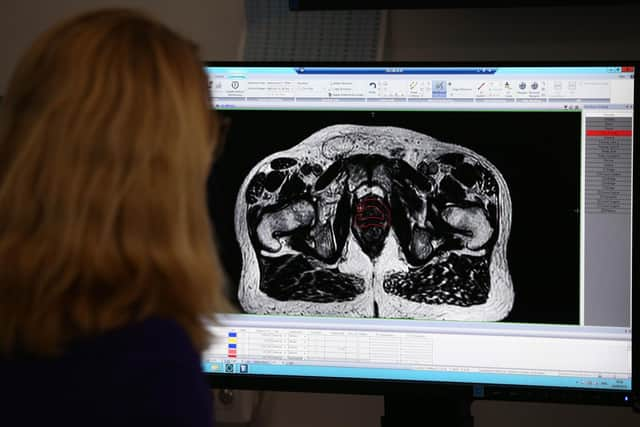Prostate cancer: Black men and those with a family history of the condition should be screened from age of 40, not 50 – Dr Gwenetta Curry
The latest data from Cancer Research UK found that one in eight men in the country will get it and, if you are over 50, Black or your dad or brother had it, you are at a higher risk. There is no standard test to screen for prostate cancer, but two are commonly used: a prostate-specific antigen (PSA) blood test and digital rectal examination, where your GP physically checks the prostate for anything abnormal.
While different people can have different symptoms, some people may not have symptoms at all. According to the NHS, possible symptoms include: needing to pee more frequently, often during the night, needing to rush to the toilet, difficulty in starting to pee, straining or taking a long time while peeing, weak flow, blood in urine or semen, and feeling that your bladder has not emptied fully.
Advertisement
Hide AdAdvertisement
Hide AdCancer screening in the UK continues to leave ethnic minorities, specifically Black men, at a disadvantage. The latest data on cancer has highlighted that Black men are twice as likely to get prostate cancer. With this new data, there should be a move to improve screening efforts in minoritised communities, particularly among Black men.
Across the UK, men are not advised to have a screening for prostate cancer until they are over 50. However, with the current data demonstrating that Black men seem to be diagnosed when their cancer is at an advanced stage, there should be a move to lower the screening age.
In other countries like the US, high-risk men are advised to get their prostate screened from the age of 40 – ten years younger than in this country. The change in prostate-screening guidelines in the US was driven by the increase in data demonstrating that Black men and individuals with a family history should be screened for cancer at that age.
Black men are often less likely to access prostate cancer services compared to white men, but in studies where Black and white men have equal access to prostate cancer care, there are fewer differences in mortality. There are very few studies that have investigated the various barriers that impact Black men’s access to screening services.
It is important to consider neighbourhood factors, physical accessibility, time available for doctor's visits, how they are treated when seeking medical help, and follow-up care. Minoritised populations are also over-represented in jobs with exposure to high levels of pollution and toxins which can increase the risk of various cancers.


The US data shows that the racial divide for prostate cancer outcomes is narrowing, with the overall five-year relative survival rate for Black men diagnosed with prostate cancer at any stage now at 97 per cent. As with any cancer diagnosis, early detection and symptom awareness is key to improving survival rates.
Scientists are working hard to investigate why certain populations are at higher risk of severe cancer than others as well as ways to improve treatment and detection. Prostate Cancer UK has funded research into medical breakthroughs relating to the condition, from multiparametric MRI scanning to improved diagnosis and the world’s first precision medicine. These funding efforts are imperative to improving treatment options and diagnosis.
Dr Gwenetta Curry is an Edinburgh University lecturer on race, ethnicity and health
Comments
Want to join the conversation? Please or to comment on this article.
